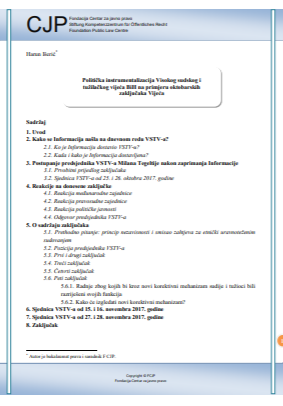Politička instrumentalizacija Visokog sudskog i tužilačkog vijeća BiH na primjeru oktobarskih zaključaka Vijeća
Political instrumentalization of the High Judicial and Prosecutorial Council of B&H on the example of the Council's October conclusions
Author(s): Harun Išerić
Subject(s): Law, Constitution, Jurisprudence, Constitutional Law, Government/Political systems, Politics and law, Evaluation research, Corruption - Transparency - Anti-Corruption
Published by: Fondacija Centar za javno pravo
Keywords: BiH; political instrumentalization; High Judicial and Prosecutorial Council of B&H; example of the Council's October conclusions; Law on HJPC; VSTV; conclusions;
Summary/Abstract: In October 2017, few days after first instance judgment of the Court of B&H in Orić case, Republika Srpska's Centre for the Investigation of War and War Crimes and the Search for Missing Persons filled an Information to the High Judicial and Prosecutorial Council of B&H about state judges and prosecutors with “suspicious war past”. Fifteen of them were accused for unethical behaviour during the war and discriminating against Serbs in war crimes proceedings. Just 12 days after the Information was received, president of the Council, Milan Tegeltija put it on the agenda of the Council meeting with prepared conclusions. Conclusion were formulated in the way to establish a control of bringing indictments for war crimes and war crimes convictions with an aim to achieve ethnically balanced proceedings. That would eventually lead to politicizing war crimes trials. Adopted conclusions were unlawful and pointless. The biggest concern raised the last one, which asked to amend the Law on HJPC which would allow Council to dismiss judge or prosecutor without conducting disciplinary proceedings. Conclusions created internal pressure on the judges and prosecutors to prosecute and judge people based on their ethnicity. Reaction of international & judicial community to the adopted conclusions indicated that they were threatening judicial independence and human rights of judges and prosecutors. After the EU pressure on the president Tegeltija, in November 2017 Council adopted new conclusions. Milan Tegeltija has misused his powers as a president of the Council. Firstly, the Center did not ask the Council to adopt any conclusions. Conclusions were drafted by president Tegeltija himself, without any consultation in or out of the Council. They were shared with members of the Council shortly before the meeting started without giving them time to prepare for debate and working material. Secondly, President Tegeltija was in regular procedure obliged to instruct the Centre to deliver its submissions directly to the institutions responsible for the questions raised. Thirdly, there was not his reaction to the Peer Review or European Commission concerns about rising problems in the B&H judiciary. But, he found it needed to react to the Information submitted by the Centre which activities are directed towards carrying out the nationalistic campaign. Republika Srpska’s Centre Information was part of the orchestrated and long-term campaign from Republika Srpska directed against judiciary of B&H. By his acts, President Tegeltija has joined to this campaign. He politically instrumentalized the Council in order to carry out political requests from Republika Srpska. Although Council’s conclusions were re-formulated, external pressure of the politicians and public & internal pressure of the Council has already had a negative effect on the independence of the judiciary in its final effect. All in all, the ultimate effect can be described as the most severe attack on the political independence of the B&H judiciary.
Series: Fondacija Centar za javno pravo - Analize
- Page Count: 46
- Publication Year: 2018
- Language: Bosnian
- Content File-PDF
- Introduction

